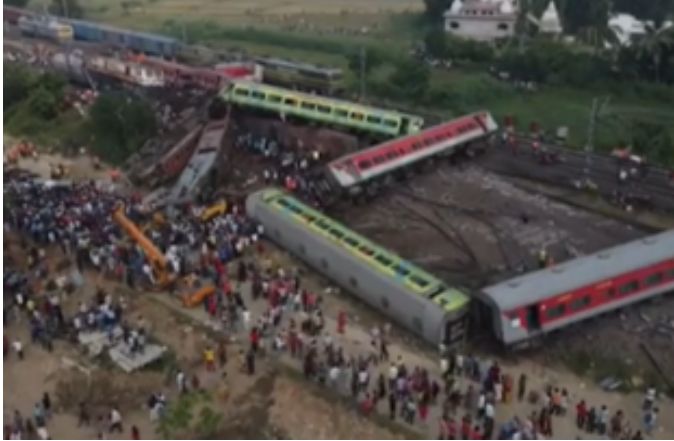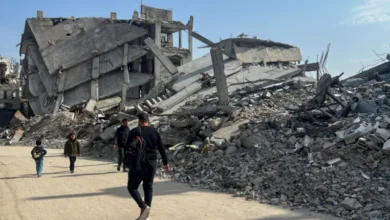India train disaster: Signal fault the likely cause, minister says

India’s railway minister has suggested a signal fault led to the Odisha rail disaster, with a “change in electronic interlocking” the likely cause.
Ashwini Vaishnaw later said the cause and people responsible for the deadly three-train crash in eastern India had been identified but did not elaborate.
India’s Railway Board said there had been “some kind of signalling interference” rather than failure.
A report into India’s worst rail accident this century is due later.
Meanwhile the death toll has been revised down to 275 after some bodies were counted twice, officials said.
Of the 1,175 injured people taken to hospital, 793 have been discharged. Some families are still searching for their loved ones.
In railway signalling the electronic interlocking system sets routes for each train in a set area, ensuring the safe movement of trains along the track.
The crash saw a passenger train collide with a stationary goods train and derail, after being wrongly directed onto a loop track by the side of the main line. Derailed carriages then struck the rear carriages of a second passenger train passing in the opposite direction.
At a press conference on Sunday, Jaya Verma Sinha from India’s Railway Board said both passenger trains had approached a Balasore district station under a green signal – indicating it was safe – within seconds of each other at the correct speed of under 130kph (81mph).
She said the passenger trains had been supposed to pass each other on the main lines but the Coromandel Express rammed into an iron ore-laden freight train on the loop line, causing the engine and some coaches to lift over the top of the heavy goods carriages.
The passenger train took the entire impact on collision and the freight train was not derailed, or even moved, she told reporters.
The Howrah Superfast Express had nearly crossed in the opposite direction, but two of its rear coaches were struck by the derailed Coromandel Express.
Ms Verma Sinha said there was “no issue with the electronic interlocking system” and said investigations indicated “some kind of a signalling interference” rather than failure.
“Whether it was manual, whether it was incidental, whether it was weather related, whether it was because of wear and tear related, whether it was a maintenance failure, all that will come out after the inquiry,” she added.
Infrastructure expert Partha Mukhopadhyay told the BBC it should not be possible for green signals to display on the main line if the track is set for the loop.
“Signal interlocking is supposed to be failsafe and this level of failure is quite unprecedented,” Mr Mukhopadhyay, from the Delhi-based think tank Centre for Policy Research, said.
On Saturday Prime Minister Narendra Modi visited the crash scene and vowed that anyone found guilty would be “punished stringently”.
Around 2,000 people are thought to have been on board the two passenger trains – the Coromandel Express, travelling between Kolkata (formerly Calcutta) and Chennai (formerly Madras) and the Howrah Superfast Express travelling from Yesvantpur to Howrah – when the crash happened at about at about 19:00 (13:30 GMT) on Friday.
Odisha state official Pradeep Jena told the BBC that at least 187 bodies remained unidentified and officials were uploading pictures of the victims on government websites and would carry out DNA testing if needed.
Rescue work was completed on Saturday and efforts were underway to clear wreckage and restart train traffic, officials said.
India has one of the largest train networks in the world with millions of passengers using it daily, but a lot of the railway infrastructure needs improving.
Trains in India can get very packed at this time of year, with a growing number of people travelling during school holidays.
The country’s worst train disaster was in 1981, when an overcrowded passenger train was blown off the tracks and into a river during a cyclone in Bihar state, killing about 800 people.





